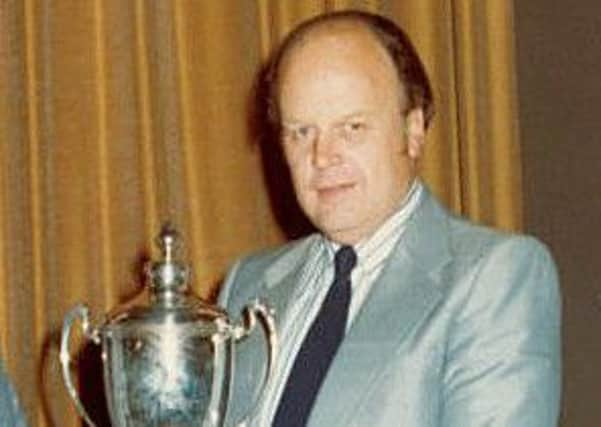Obituary: Henry Clark Darnton, DFC


Henry Clark Darnton DFC, Bomber Command veteran and businessman.
Born: 1 June, 1922 in Stockton-on-Tees.
Died: 17 November, 2015, in Dundee. Aged 93.
Harry Darnton absolutely epitomised the spirit and guts of the Bomber Boys whose courage in the skies of Occupied Europe went largely unrecognised for 70 years.
Advertisement
Hide AdAdvertisement
Hide AdAs a teenager he had been inspired when, witnessing the first German air attack on Britain, over the Firth of Forth, he saw one of the enemy planes being sent on its way by a Spitfire of the City of Edinburgh 603 Squadron.
It was October 1939, just six weeks into the Second World War, and Darnton was playing a round of golf when the surprise raid on the Royal Navy fleet and base at Rosyth took place. Just a few years later he would be at the heart of the maelstrom of battle himself, crewing Lancaster bombers on more than 30 missions over Germany, surviving two crash landings and winning the Distinguished Flying Cross for valour.
He was just 22 when the award of his DFC was announced by the King – the average age of the Bomber Command crews, whose life expectancy was as little as six weeks and who lost more than 55,500 colleagues in the quest to rid Europe of Nazi rule.
Born in Stockton-on-Tees, he was educated at the local Holy Trinity Higher Grade and Richard Hind schools before moving to Scotland with his family in 1937. He attended North Berwick High School and then Skerry’s College in Edinburgh where he prepared for the Civil Service exams. On the day of the examination he suffered a heavy nosebleed and bled profusely over the test papers. He managed to complete the test – only to discover that there were posts for just 500 of the 7,500 candidates.
Having had his hopes dashed of a career in the Civil Service he then became a management trainee at William Crawford & Sons, biscuit manufacturers. Some 18 months later he was called up and joined the RAF at 21, first posted to RAF Cottesmore in Rutland, an operational training unit.
He also trained in South Africa and by 1943 he was attached to No 49 squadron of Bomber Command – motto “Cave Canem” (Beware of the dog) – at RAF Fiskerton near Lincoln. Having acquired number of skills – he was a navigator, gunner and bomb aimer – he found that one in particular, as co-pilot, came in particularly handy on his second mission to Cologne.
It was a fairly clear night and as they approached the target dozens of searchlights played across the sky. Suddenly they were subjected to bursts of anti-aircraft flak but still managed to drop their bombs. It was only after that they realised the pilot, Trevor Jupp, was slumped over the controls. Darnton took over, flying from the co-pilot’s position, until the pilot, who had been given a shot of morphine, recovered enough to re-take control of the plane. But more drama was yet to unfold: the Lancaster was attacked from the rear by a Junkers Ju 88 which raked it with bullets. Fortunately both Lancaster gunners were quick off the mark and the last Darnton saw of the German aircraft was a plume of smoke and flames as it plunged earthwards.
As they headed home Darnton volunteered to land the Lancaster, which he always described as a superb aircraft, but his offer was declined with an uncharacteristic expletive from the pilot who managed to bring her down in a perfect landing – despite the large chunk of shrapnel embedded in his shoulder.
Advertisement
Hide AdAdvertisement
Hide AdAfter six weeks in hospital the pilot returned to duty and on 29 September, 1943 the crew was ordered to bomb Hanover. They loaded up with 4.5 tons of explosives, including a 4000lb “cookie” bomb, a particularly dangerous load, and more than 100 incendiary devices. Everything was going smoothly until, 50 miles from the target, they noticed another Lancaster alongside them. Inexplicably it opened up its guns on them and Darnton noted: “It was not the first time we had been fired on by one of our own bombers.”
They later discovered damage to the aircraft prevented their own bomb doors opening. Knowing they knew they would have to jettison their load at sea they tried to drop a bomb through the door to open it. When that failed, Darnton carefully unscrewed some panels in the aircraft floor directly above the bombs. One of the lighter bombs broke open the door and finally they jettisoned the explosives. However, they did not know whether the undercarriage mechanism or brakes were operational and were ordered to make for RAF Wittering which had a three-mile grass runway, a suitable landing site for planes in distress.
With measured understatement he observed: “In due course we landed safely. This ordeal did not count as a mission.”
He flew his final operation on 1 March, 1944 to Stuttgart and later transferred to the Provost Branch, a military police wing, before being demobbed in 1949.
Post-war he joined Heinz and became a general manager, involved in the development and catering side. He had also been a divisional manager, running the northern region, a demanding role which he fulfilled extremely well, and was popular with both staff and customers.
As his war service displayed, he was most capable and effective, a persuasive and positive leader, a man who got things done and who was able to make the most of any circumstances in which he found himself. Though outgoing he was shy of his own achievements, yet undoubtedly proud of his war record and that of Bomber Command which was finally recognised with a memorial in London unveiled in 2012.
He is survived by his wife Norma, whom he married in Dundee in 1974.
ALISON SHAW